Acoustics & Vibrations Blog Posts

6 Examples of Simulation-Driven Loudspeaker Development
From headphones for virtual reality gaming to powerful transducers for hearing aids, here are 6 examples of multiphysics simulation being used to develop new and improved loudspeaker products.
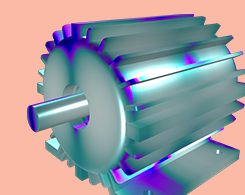
A Quiet Revolution: Analyzing Electric Motor Noise via Simulation
The sound we hear from electric-powered machines is a multiphysics phenomenon: A motor’s electromagnetic activity sends vibrations through both the machine and the surrounding air.
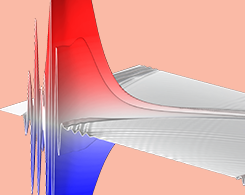
Analyzing HIFU Propagation Through a Tissue Phantom
High-intensity focused ultrasound (HIFU) is used for surgery, cancer therapy, shock wave lithotripsy, and more. Learn about how simulation can be used to analyze this noninvasive technique.
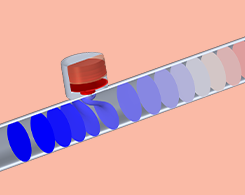
Modeling Acoustical Properties of Porous Media in COMSOL®
A guest blogger from the University of Sheffield introduces the Johnson–Champoux–Allard–Lafarge (JCAL) model for analyzing acoustical properties of porous media.
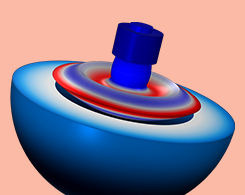
Keynote Video: Rapid Prototyping for Sonar Systems
Engineers at Northrop Grumman follow a 4-part rapid prototyping design phase: Design, manufacturing a prototype, testing and design verification, and manufacturing of the final design.
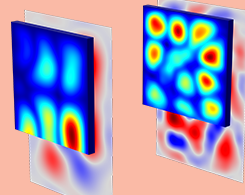
Modeling Sound Transmission Loss Through a Concrete Wall
The sound loss transmission (STL) through a building component is the logarithmic ratio between the total incident power on the structure relative to the total transmitted power.
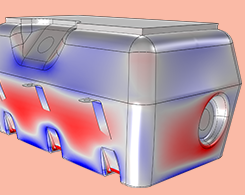
What Is the Best Way to Analyze Fuel Tank Vibration?
In a traditional approach for modeling a fuel tank, the fluid mass is dispersed through the tank’s wetted surface. A multiphysics method specifically models the acoustic pressure in the fluid.
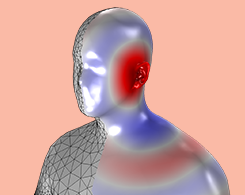
Computing the HRTF of a Scanned Geometry of a Human Head
Designing cochlear implants, hearing aids, headphones, and other audio devices requires precise measurements of the head-related transfer function (HRTF). Simulation and geometry import can help.
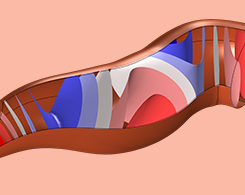
Modeling an Ear Canal’s Acoustics to Optimize In-Ear Audio Products
Ever notice an echo-like sound when wearing headphones or earbuds? Called the occlusion effect, this phenomenon can be studied using acoustics modeling to design better in-ear audio products.

Introduction to the Elastic Waves, Time Explicit Interface
From nondestructive testing to seismic wave propagation in soil and rock, there are many application areas that involve the propagation of elastic waves in solids and vibrations in structures.
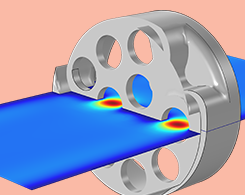
Using Transfer-Matrix Computation to Analyze Wax Guard Acoustics
The wax guard is an important part of a hearing aid, as it can improve the functionality and overall lifespan. We feature an acoustics model of a wax guard based on an actual industry example.
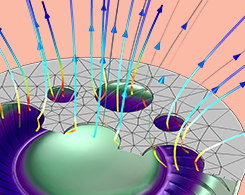
Optimizing Microspeaker Designs Using Simulation
From watches to laptops, microspeakers are found in devices we use everyday. In this blog post, learn how simulation can help optimize microspeakers and improve sound quality.
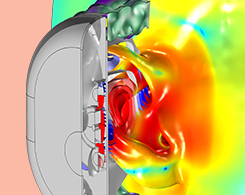
Analyzing the Sound Pressure Level of Headphones on Ears
Designing headphones presents a unique challenge: Unlike with loudspeakers, you can’t measure the sensitivity using a free-field setup due to the speaker’s closeness to the ear.

Modeling of NDT Methods Using COMSOL Multiphysics®
Active thermography, active ultrasonic, guided waves, acoustic emissions, and eddy current testing: 5 examples of how nondestructive testing (NDT) methods can benefit from multiphysics modeling.
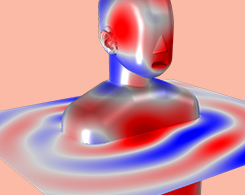
Analyzing the Acoustics of a Head and Torso Simulator
Acoustics engineers designing hearing aids, cellphones, and headphones can perform standardized measurements faster and cheaper with simulation, as shown in this example.
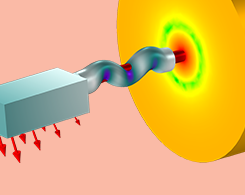
How to Use Solver Suggestions in Acoustics Modeling
When you model large, industry-scale acoustics, ever find it challenging to efficiently solve the problem with the hardware at hand? Enter the solver suggestions in COMSOL Multiphysics®.

Samsung Amps Up Loudspeaker Designs with Simulation
Some organizations reach success and then shift the goal post. Take Samsung, for instance: Although they lead the market for televisions and smartphones, they set their eyes on another goal…
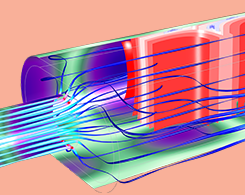
How to Automate Meshing in Frequency Bands for Acoustic Simulations
There is a large frequency range involved in acoustics phenomena, which means that modeling acoustics problems requires meshing a large wavelength range. COMSOL® offers an efficient way to do so.
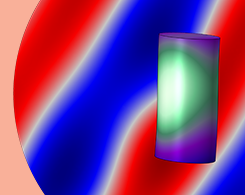
Introduction to Modeling Acoustic-Structure Interactions in COMSOL®
To model an ASI problem, you need to account for the behavior of elastic waves in solids, pressure waves in fluids, and their interaction. The COMSOL® software includes interfaces for doing so.
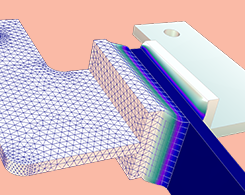
Frequency Response of Mechanical Systems
Read this blog post for a detailed look at damped mechanical systems, a guide to setting up frequency-response analyses in COMSOL®, and a discussion of how to interpret your results.

Analyzing Topology Optimization of a Photoacoustic Spectroscopy Cell
Signals generated via photoacoustic spectroscopy are often weak and difficult to detect. Acoustic cells can be used to amplify the signal, but they need to be designed with sensitivity in mind.

Using the Port Boundary Condition in Acoustic Waveguide Models
By combining several Port boundary conditions, you can easily compute the transmission and insertion loss in exhaust and muffler systems. See more benefits of this feature for acoustics modeling.
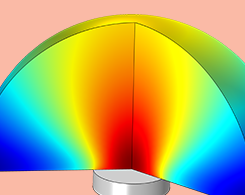
Fine-Tuning the Design of Piezoelectric Transducers with Simulation
A variety of use cases and a variety of physics: Piezoelectric transducer designs need to account for electric currents, pressure acoustics, stress-strain, and acoustic-structure interaction.

Defying Gravity with a Realistic Acoustic Levitator Model
It’s not just science fiction: Objects really can levitate. 1 way this is possible is by using sound waves to lift and suspend particles midair. Simulation can broaden the use of this technology.
